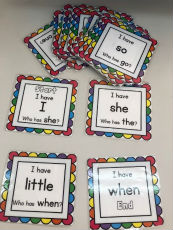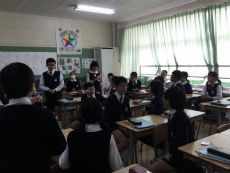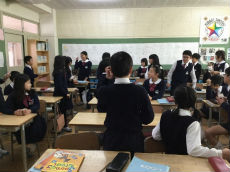
学園ブログ

- ホーム
- 世界へはばたく
世界へはばたく

2018年03月05日
5年生での取り組み

今年の5年生は4月からめざましく成長しました。1学期、2学期は、とにかく子どもたちが自信をもって英語を使うことを第一に考え、取り組んできました。毎時間、友だちの前で話したり、フォニックスの音認識の練習をしたり、Tricky words(ひっかけ単語)を読んだりと、さまざまな活動を盛り込んできました。Tricky words(ひっかけ単語)とは、フォニックスのルールには当てはまらないけれど、日常的に非常によく使われる言葉のことです。
冬休みの宿題(お正月にすることについて、書いてくる。)をきちんとこなし、グループでそれを読む練習をした後、子どもたちのモチベーションは日に日に高まりました。子どもたちが上手に発表するようになるには、まず、Tricky wordsに十分に慣れさせ、自信をつけさせることだと考えました。「覚えなさい。」というのではなく、何か、ゲーム感覚で楽しく身につけさせることはできないかと考えました。
そこで考えたのが、”Tricky words game”です。 全員、2つのTricky wordsが書かれたカードを持ちます。1人が、カードに書かれた単語を全員に聞こえる声で読み上げ、他の人はそれを聞いて、自分の持っているカードに読み上げられた単語が書いてあるかどうかを確かめます。そして、自分の持っているカードに書いてあったら、その人は次にカードを読み上げる人です。例えば、ある子が “I have I, who has you.”と書かれたカードを読み上げると、今度は、”I have you, who has your”と書かれたカードを持っている子が読み上げます。このようにして、36人全員でリレーのようにつないでいきます。
全員、2つのTricky wordsが書かれたカードを持ちます。1人が、カードに書かれた単語を全員に聞こえる声で読み上げ、他の人はそれを聞いて、自分の持っているカードに読み上げられた単語が書いてあるかどうかを確かめます。そして、自分の持っているカードに書いてあったら、その人は次にカードを読み上げる人です。例えば、ある子が “I have I, who has you.”と書かれたカードを読み上げると、今度は、”I have you, who has your”と書かれたカードを持っている子が読み上げます。このようにして、36人全員でリレーのようにつないでいきます。

この活動をしていて驚いたのが、子どもたちの中で「もっとスムーズにやってみたい。」という想いが芽生えてきたことです。タイムを計り、そのうち、他のクラスのタイムと競い合うようになりました。1回やるごとに、良かった点、次回改善できる点について子どもたちに考えさせました。「大きな声で言わなければならないけれど、はっきりと言わないと聞き取りにくい。」、「2つめの単語は次の人につなげる言葉だから、特にはっきりと言った方がもっとスムーズになる。」「自信を持って、素早く読む。」、「周りで困っている友だちがいたら、読み方を教えてあげる。」、「“are, all, old” “you, your” “so, go, no” “the, they, their”など、似ている言葉があるから注意して聞く。」、、、たくさんの意見が出ました。
一番驚いたのが、子どもたちの方から、“one more time, one more time”と全員でコールしたり、英語で”You are beautiful!”と先生にお世辞を言ったりし、もっとやりたいという意思表示をしてきたことです。
授業の終わりには、子どもたちが知っているフォニックスのルールを使って読める簡単な絵本を自分で読む練習をします。”Trick word game”で培われた十分に大きな声、イントネーションや韻ではりきって読むことができました。
今、子どもたちは、心からもっと英語で話したい、読んだり書いたりもしたいと思うまでに成長しました。
これからが楽しみです。
This year in the 5th grade, the students have seen major improvements since April. The first and second term was spent fostering interest and developing their ability to use English with confidence. Each class had a variety of activities that allowed students to practice speaking in front of their peers, practicing phonics sound recognition and reading tricky words. Tricky words are words that cannot be read using the phonics system. These words are important as they appear in daily readings on a frequent basis.
In the third term, the students’ motivation increased by leaps and bounds after successfully completing their Winter Homework and practicing their presentation with small groups. For the students to read their speeches with success, they needed to increase their confidence and fluency of common tricky words. Instead of asking the students to “memorize” these words, the teachers turned this activity into a game. The students each have 2 tricky words that they must read out loud while their classmates listen to see if their word has been called. If their word is the one called, they must read the words on their card. This continues until all students have read their card.
The surprising side effects of this activity was the increased desire to perform this task as smooth as possible. The students would compete against the clock and try to improve their time using the other 3 classes. After each trial, the students would be quizzed about what they did good and what they could do better in the next run. The students came up with many impressive possibilities. The list includes; speaking clearly in a loud but clear voice, emphasizing the last word to make it easier to understand, reading the card quickly, having confidence, helping the people around you to make sure they can read it clearly, hearing the differences between similar words such as “are, all, old” “you, your” “so, go, no” “the, they, their”
The biggest surprise for the English teachers was the students desire to improve and their eagerness to keep trying with some classes chanting “one more time, one more time” or giving the teachers compliments IN ENGLISH to show their desire to continue and improve the class results.
At the end of the class the students then practice reading decodable stories. The students motivation to read with a stronger voice, intonation and rhyme have been a welcomed bi-product of the “Tricky word game”. We are excited for this class and their future. They are truly excited to improve their ability to speak, read and write in English.
(小学校教諭 松本セイラ)
